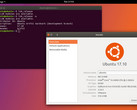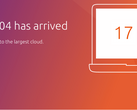UPDATE 4/27/2018: Ubuntu 18.04 LTS has now been released. An install image can be downloaded here.
UPDATE 4/26/2018: Canonical has released a note saying that a last minute bug affecting the live session options in Ubuntu, Ubuntu MATE, Ubuntu Kylin, and Ubuntu Budgie is still being patched. Ubuntu 18.04 LTS will be available for download here once the bug is patched (which should be later today).
Ubuntu is one of the most popular Linux distributions with some of the best support in the industry. Canonical, the organization behind Ubuntu, is known for timely releases of new versions, and today marks the release of the latest iteration of the OS. Ubuntu 18.04 LTS (long-term support) is now available.
Ubuntu 18.04 (also known as “Bionic Beaver”) is based on the 4.15 version of the Linux kernel. The biggest changes, at least for upgraders from 16.04 LTS, lie in the desktop environment. Canonical announced that the default desktop would switch from Unity back to GNOME with Ubuntu 17.10, and 18.04 LTS continues that decision. While Unity was fairly close in aesthetic to GNOME, there are small tweaks, like the window control buttons shifting to the right corners of windows rather than the left. The Settings, Ubuntu Software, and other default apps also received some UI overhauls.
Default apps have received some updates, too. Ubuntu 18.04 LTS now comes with LibreOffice 6.0, GNOME v3.28 apps, and others. The default calendar app also includes a weather forecasting feature, and Emojis will display in color in most apps.
Another big change reduces the number of supported systems; Canonical will no longer provide 32-bit installer images, so some older devices and ARM-based computers may not support this or later versions of Ubuntu. (Other distros, like Lubuntu, may still offer 32-bit support.) Ubuntu 18.04 LTS has an option for a "minimal install," which only installs a basic desktop environment, a web browser, and a few core utilities, cutting out many of the default apps that come with the full release.
The update brings support for new hardware from Intel, AMD, and other manufacturers. This includes features like AMD’s secure memory encryption, MD drivers for RAID enhancement, and better power management for systems using SATA Link Power Management. The GNOME shell also now supports Thunderbolt 3 as well as driverless printing.
The 18.04 release will also use OpenJDK 10 as its default Java development kit (JDK) but will update to OpenJDK 11 when that hits widespread release in September of this year. OpenJDK 8 will still be available for the next 5 years is users choose to downgrade. 18.04 brings some new security features, including mitigations to protect against the infamous Spectre and Meltdown vulnerabilities in Intel and AMD processor architectures. For users upgrading from 16.04 LTS, there are a few other base system changes, including the use of a swap file rather than a swap partition and update to Python 3.6 rather than Python 2, among others.
There are quite a few bugs that affect the new version as well, so potential upgraders should take note. Some of the most glaring bugs include a boot failure if the computer with certain Nvidia GPUs is connected to a display via DisplayPort and some installation errors if the user forces a UEFI installation. Check the Wiki here for a full list of known bugs. Canonical is aware of these and working on a patch.
Ubuntu 18.04 LTS is already supported by quite a few variant flavors, like Kubuntu, Lubuntu, Ubuntu MATE, and more. You can check those distros' individual Wikis for release notes (a list is provided at the bottom of the official Ubuntu Wiki). As an LTS release, Canonical promises support for 5 years until 2023, although some flavors may have a shorter lifespan.



















